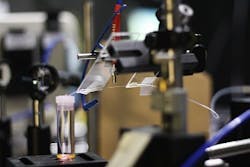Using a liquid laser, researchers at the University of Michigan (Ann Arbor, MI) have developed a way to detect the slight genetic mutations that might predispose a person to a particular type of cancer or other diseases. The work could advance understanding of the genetic basis of diseases, and also has applications in personalized medicine.
The current approach uses fluorescent dye and other biological molecules to find and bind to mutated DNA strands. When a patrol molecule catches one of these strands, it emits fluorescence. However, the patrol molecules tend to bind to healthy DNA as well, giving off a background glow that is only slightly dimmer than a positive signal. Xudong Fan, an associate professor in the Department of Biomedical Engineering and principal investigator on the project, says that failure to discern the difference in signals could yield misdiagnosis. "The patient may have the mutated gene, but you wouldn't detect it," he says.
With conventional fluorescence, the signal from mutated DNA might be only a few tenths of a percent higher than the background noise. But with Fan's liquid laser approach, it's hundreds of times brighter.
Fan, who works at the intersection of biomedical engineering and photonics, has been developing liquid lasersâwhich amplify light by passing it through a dyeâfor the past five years. Finding a way to amplify the intrinsic difference in the signals, Fan's setup amplifies the signal in a glass capillary called a "ring resonator cavity."
Last year, Fan and his research group found that they could employ DNA to modulate a liquid laser, or turn it on and off. His group is one of just a few in the world to accomplish this, he says. Looking at the laser output enabled him and his team to see what's causing the different outputsâthereby enabling them to detect differences in the DNA.
Currently, the university is pursuing patent protection for the intellectual property, and is seeking commercialization partners to help bring the technology to market.
The results of the work have been published in Angewandte Chemie. For more information, please visit http://onlinelibrary.wiley.com/doi/10.1002/anie.201107381/abstract.
-----
Follow us on Twitter, 'like' us on Facebook, and join our group on LinkedIn
Follow OptoIQ on your iPhone; download the free app here.
Subscribe now to BioOptics World magazine; it's free!
